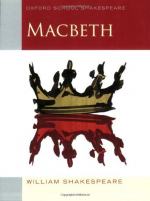|
This section contains 12,959 words (approx. 44 pages at 300 words per page) |

|
SOURCE: “‘Born of Woman’: Fantasies of Maternal Power in Macbeth,” in Cannibals, Witches, and Divorce: Estranging the Renaissance, edited by Marjorie Garber, The Johns Hopkins University Press, 1987, pp. 90-121.
In the following essay, originally presented in 1985, Adelman suggests that Macbeth represents a powerful fantasy of escape from an absolute and destructive maternal power.
In the last moments of any production of Macbeth, as Macbeth feels himself increasingly hemmed in by enemies, the stage will resonate hauntingly with variants of his repeated question, “What’s he / That was not born of woman?” (5.7.2-3; for variants, see 5.3.4, 6; 5.7.11, 13; 5.8.13, 31).1 Repeated seven times, Macbeth's allusion to the witches' prophecy—“none of woman born / Shall harm Macbeth” (4.1.80-81)—becomes virtually a talisman to ward off danger; even after he has begun to doubt the equivocation of the fiend (5.5.43), mere repetition of the phrase seems to Macbeth to guarantee his invulnerability. I want in this...
|
This section contains 12,959 words (approx. 44 pages at 300 words per page) |

|


